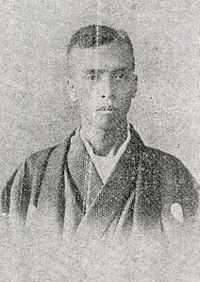Saitō Ryokuu

Saitō Masaru (斎藤 賢, 24 January 1868 – 13 April 1904), better known by his pen name Saitō Ryokuu (斎藤 緑雨), was a Japanese author and critic who lived during the Meiji Era.
Biography
In 1896, with Mori Ōgai (森 鷗外) and Kōda Rohan (幸田 露伴), Ryokuu started a literary journal, Mezamashi gusa (めさまし草) in which Takekurabe (たけくらべ) by Higuchi Ichiyō (樋口 一葉 ) was met with high critical acclaim. After Ichiyō died on November of that year, Ryokuu helped her mother and sister make a living although he was far from being well-off. His literary friends include Kōtoku Shūsui (幸徳 秋水), Baba Kochō (馬場 孤蝶) and Yosano Tekkan (与謝野 鉄幹).
Ryokuu was a distinguished aphorist, as well as one of the most outspoken critics. Collections of his aphorisms were published in the late 20th century.
In 1904, the tuberculosis which had plagued Ryokuu for years worsened, and no medical care helped him recuperate. On his deathbed, he referred Ichiyō's diaries, which he had hoped to publish, to Kochō, and dictated him his own obituary. He died in the morning of 13 April of the same year.
See also
External links
- 作家別作品リスト:斎藤 緑雨 Aozora Bunko page for Saitō Ryokuu
|